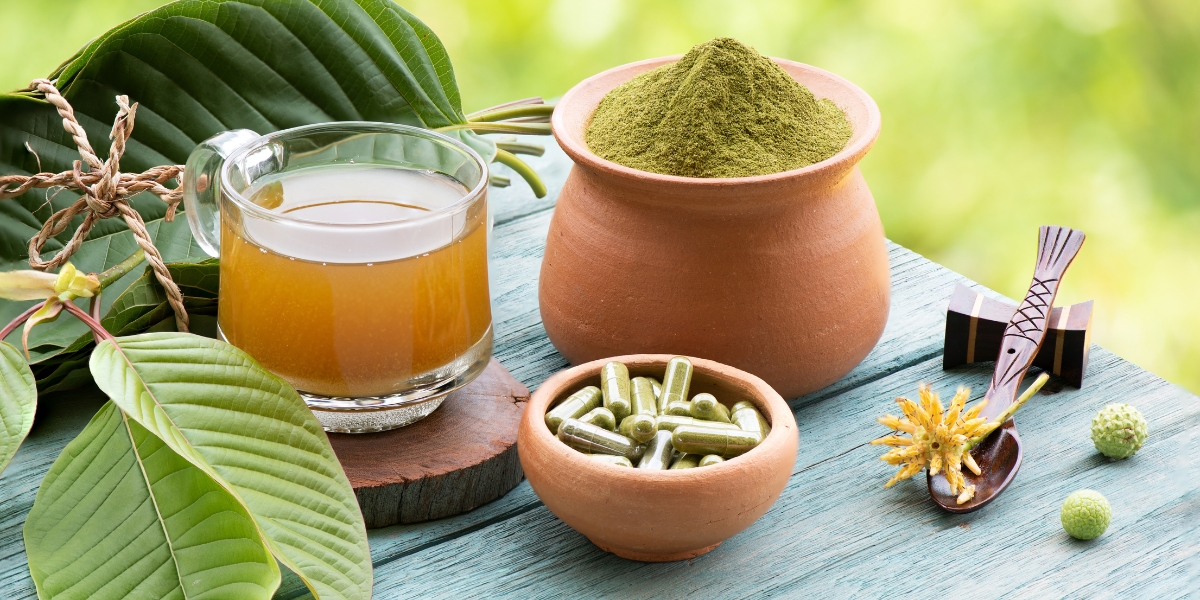Is Kratom Addictive?

Doctors, addiction specialists, and long-time kratom drug users agree it can result in addiction. However, there is an ongoing discussion about whether the likelihood of developing an addiction to kratom outweighs its perceived benefits.
Supporters of kratom highlight its historical use in alternative medicine and its plant origin as positive aspects. They urge further research into its potential medical advantages.
On the other hand, emergency departments and poison control centers are seeing more serious side effects and deaths linked to high doses of this substance. Critics emphasize that many highly addictive drugs like heroin and cocaine come from plants. Kratom (Mitragyna speciosa) is naturally addictive because it has similar properties to potent opioids and affects the brain’s opioid receptors similarly.
Some think because it is a natural psychoactive substance with mind-altering effects, it’s a less addictive pain reliever than opioids. As a result, the demand for kratom products in the United States is increasing.
Ultimately, the effectiveness of kratom for medical purposes is still uncertain. Although, it is widely recognized that it’s addictive and can lead to significant harm.
What Is Kratom?
Kratom, a plant native to Southeast Asia, has increasingly received recognition in the United States. Although the tropical tree was not well-known in America until recently, it has been used as traditional medicine since the 19th century because of its pain-relieving properties. A scary characteristic of kratom is its ability to produce effects like opioids, depending on the dosage administered.
Previously, the usual method of consuming it involved chewing the whole kratom leaves or preparing them as tea. However, more recently, it has been sold in different forms, such as tablets, capsules, or powdered forms that can be con blended with food or beverages. It is marketed and promoted as a dietary supplement or a mood-enhancing aid.
Many people shop for and consume kratom products for recreational purposes, tempted to feel its psychoactive effects. Additionally, some resort to kratom as a means of self-medication to alleviate symptoms associated with opioid withdrawal or chronic pain.
Researchers categorize it and “kratom-based” items as new psychoactive substances (NPS), referring to drugs formulated or altered to imitate more potent substances, particularly opioids. Another feature of kratom is its tendency to avoid detection on conventional drug tests.
The United States Drug Enforcement Administration (DEA) has recognized it as a dangerous substance and is actively monitoring its usage. The Food and Drug Administration (FDA) has yet to approve its medicinal uses and has released a statement regarding its importation, giving them authority to seize potentially suspicious shipments.
Due to the lack of regulations on kratom in the United States and its importation from unknown origins, the FDA advises that the risk of contamination with harmful substances, such as heavy metals, is exceptionally high.
In addition, the strength of every batch of kratom can differ, giving rise to unpredictable and dangerous effects. Currently, kratom has been banned in 30 countries and six states across the United States due to its potential for addiction and misuse.
Is Kratom Addictive?
Kratom has addictive properties. Despite its promotion as a remedy for opioid withdrawal symptoms and cravings, it can lead to addiction. Engaging in risky behavior and attempting to overcome addiction to one substance by substituting it with another can result in multiple substance use disorders.
Medical professionals depend on the Diagnostic and Statistical Manual of Mental Disorders Fifth Edition (DSM-5) as a crucial tool for diagnosing substance use disorders. Many studies have demonstrated that most individuals who consume it meet the criteria for a substance use disorder.
Regular users often report experiencing physical dependence on kratom, developing tolerance to its effects, and experiencing withdrawal symptoms after they stop using.
It is possible to become physically dependent on kratom without meeting the diagnostic criteria for addiction. However, kratom interacts with opioid receptors in the brain, triggering pleasurable feelings and reinforcing drug use, thereby increasing the potential for abuse.
Many people who use kratom also report abusing other substances, particularly opioids and stimulants. Engaging in polysubstance abuse further increases the risk of addiction.
While kratom addiction lacks a specific diagnosis in the DSM-5, addiction specialists and the Substance Abuse and Mental Health Services Administration (SAMHSA) recommend sticking to the treatment guidelines for opioid addiction.

Effects of Kratom
The effects of kratom can resemble those of opioids and stimulants, depending on the dosage. Usually, kratom’s stimulant effects kick in between 20 to 60 minutes after ingestion, depending on the method and dosage.
These effects typically last for two to six hours. It is important to note that combining kratom with other substances, such as drugs and alcohol, will influence the results and possible side effects.
Kratom users desired effects include:
- Increased energy
- Heightened awareness and focus
- Talkativeness
- Pain relief
- Uplifted mood
- Reduced anxiety
- Relaxation
- Drowsiness
- Hallucinations
- Weight loss
- Loss of appetite
Long-Term Effects
Extensive research on the long-term effects of kratom is still limited, as it is a relatively new substance compared to more widely known and commonly abused drugs. Nevertheless, drawing from reports documenting its long-term use, the National Institutes of Health (NIH) have identified specific overall long-term effects.
These long-term effects may include the following:
- Liver damage
- Paranoia
- Addiction
- Insomnia
- Seizures
- Inability to feel pleasure
- Skin discoloration
It is worth noting that most kratom users also use polysubstance, meaning they use multiple substances. This can make determining which specific substance is responsible for certain effects challenging.
Side Effects
Kratom’s adverse effects can be unpredictable and vary from user to user. According to the National Institute on Drug Abuse (NIDA), it often contains other unknown substances or drugs that are added to enhance its potency. This significantly increases the risk of experiencing unpredictable and dangerous side effects.
Common side effects of kratom may include:
- Confusion
- Hallucinations
- Nausea and vomiting
- Sweating
- Sensitivity to light and sound
- Aggression
- Psychosis
- Itching
- Dry mouth
- Increased heart rate
- High blood pressure
- Heart palpitations
- Slowed breathing
- Constipation
- Abdominal pain
When it is combined with opioids or central nervous system depressants, it can lead to potentially life-threatening side effects due to its interaction with the opioid receptors in the brain.
Kratom Withdrawal
Individuals who have developed physical dependence or addiction to kratom will experience withdrawal symptoms when they stop using it. Kratom withdrawal shares similarities with opioid withdrawal, as it affects the brain and disturbs the delicate chemical balance within the body.
The duration and intensity of withdrawal symptoms and cravings can vary depending on the severity of dependence and addiction, the person’s physical and mental health, and the presence of other substances contributing to withdrawal symptoms.
Quitting kratom can lead to mental and physical withdrawal effects, which may include:
- Mood swings
- Cravings
- Changes in appetite
- Muscle, joint, and bone pain
- Fluctuations in body temperature
- Nausea and vomiting
- Flu-like symptoms
- Anxiety
- Depression
- Muscle spasms
- Jerky eye movements
- Vision changes
- Sleep disturbances
- Dehydration
Many individuals underestimate the difficulty of kratom withdrawal and may relapse to alleviate the symptoms and avoid further withdrawal. Residential treatment for addiction offers significant benefits, as it provides continuous support and resources to help alleviate the discomfort of withdrawal and facilitate a smooth transition into follow-up addiction treatments and therapies.

Kratom Addiction Treatment
If you or someone you care about is struggling with a substance use disorder and is ready to make a positive change, compassionate and practical resources are available.
Northridge Addiction Treatment Center is dedicated to helping individuals overcome addiction by addressing all aspects of the condition. Through a dual diagnosis approach, we identify and create a personalized treatment plan that addresses co-occurring conditions alongside the addiction. Our tranquil and private residential treatment center offers a supportive environment where our licensed and experienced team will work with you to build confidence and equip you with the necessary skills to embrace a life of recovery.
If you have any questions about the available treatment options, please don’t hesitate to contact us. We are committed to supporting you as you embark on your journey to recovery.
Find Meaningful Recovery
Our caring and compassionate specialists are eager to help you comfortably navigate this journey to recovery. Our individualized treatment plan, programs, and therapies may be a perfect match for you or your loved one. Let us assist you in living the happy life you deserve. It starts with a phone call.




